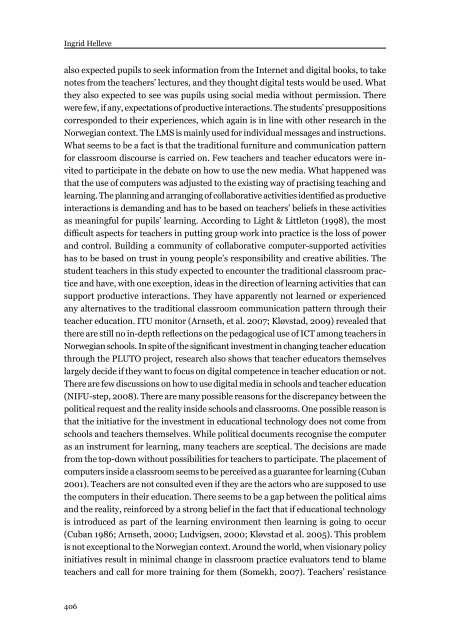Download issue - Umeå universitet
Download issue - Umeå universitet
Download issue - Umeå universitet
Create successful ePaper yourself
Turn your PDF publications into a flip-book with our unique Google optimized e-Paper software.
Ingrid Helleve<br />
also expected pupils to seek information from the Internet and digital books, to take<br />
notes from the teachers’ lectures, and they thought digital tests would be used. What<br />
they also expected to see was pupils using social media without permission. There<br />
were few, if any, expectations of productive interactions. The students’ presuppositions<br />
corresponded to their experiences, which again is in line with other research in the<br />
Norwegian context. The LMS is mainly used for individual messages and instructions.<br />
What seems to be a fact is that the traditional furniture and communication pattern<br />
for classroom discourse is carried on. Few teachers and teacher educators were invited<br />
to participate in the debate on how to use the new media. What happened was<br />
that the use of computers was adjusted to the existing way of practising teaching and<br />
learning. The planning and arranging of collaborative activities identified as productive<br />
interactions is demanding and has to be based on teachers’ beliefs in these activities<br />
as meaningful for pupils’ learning. According to Light & Littleton (1998), the most<br />
difficult aspects for teachers in putting group work into practice is the loss of power<br />
and control. Building a community of collaborative computer-supported activities<br />
has to be based on trust in young people’s responsibility and creative abilities. The<br />
student teachers in this study expected to encounter the traditional classroom practice<br />
and have, with one exception, ideas in the direction of learning activities that can<br />
support productive interactions. They have apparently not learned or experienced<br />
any alternatives to the traditional classroom communication pattern through their<br />
teacher education. ITU monitor (Arnseth, et al. 2007; Kløvstad, 2009) revealed that<br />
there are still no in-depth reflections on the pedagogical use of ICT among teachers in<br />
Norwegian schools. In spite of the significant investment in changing teacher education<br />
through the PLUTO project, research also shows that teacher educators themselves<br />
largely decide if they want to focus on digital competence in teacher education or not.<br />
There are few discussions on how to use digital media in schools and teacher education<br />
(NIFU-step, 2008). There are many possible reasons for the discrepancy between the<br />
political request and the reality inside schools and classrooms. One possible reason is<br />
that the initiative for the investment in educational technology does not come from<br />
schools and teachers themselves. While political documents recognise the computer<br />
as an instrument for learning, many teachers are sceptical. The decisions are made<br />
from the top-down without possibilities for teachers to participate. The placement of<br />
computers inside a classroom seems to be perceived as a guarantee for learning (Cuban<br />
2001). Teachers are not consulted even if they are the actors who are supposed to use<br />
the computers in their education. There seems to be a gap between the political aims<br />
and the reality, reinforced by a strong belief in the fact that if educational technology<br />
is introduced as part of the learning environment then learning is going to occur<br />
(Cuban 1986; Arnseth, 2000; Ludvigsen, 2000; Kløvstad et al. 2005). This problem<br />
is not exceptional to the Norwegian context. Around the world, when visionary policy<br />
initiatives result in minimal change in classroom practice evaluators tend to blame<br />
teachers and call for more training for them (Somekh, 2007). Teachers’ resistance<br />
406

















